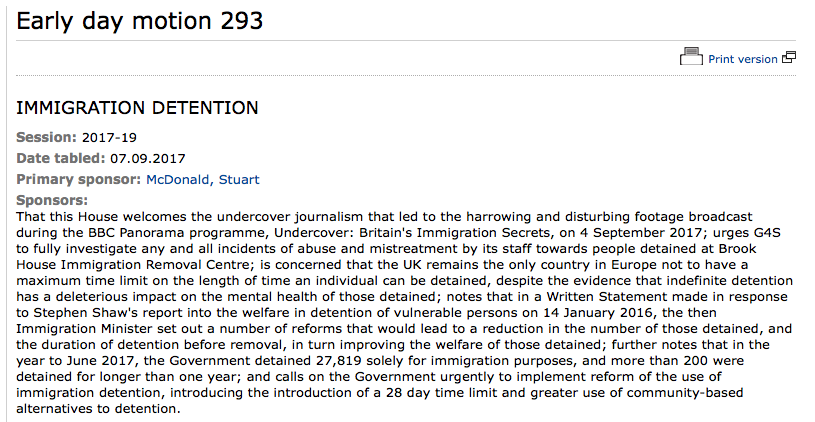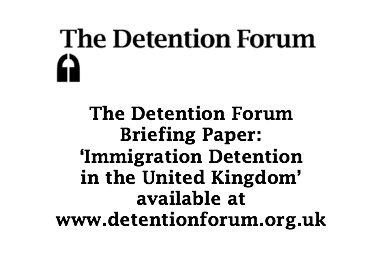26 September 2017
Following the death of a Chinese person at Dungavel in Scotland and the Panorama documentary on Brook House near Gatwick Airport, immigration detention is yet again under intense scrutiny.
At the Labour party conference in Brighton, a number of campaigners and supporters have been speaking to politicians and other conference attendees about the need for a time limit on immigration detention.
Thank you @jeremycorbyn for agreeing indefinite detention should end. It's #Time4aTimeLimit #Lab17 #LabConf17 pic.twitter.com/YHgRsAWM80
— The Refugee Tales (@RefugeeTales) September 25, 2017
Team Horsham say #Time4aTimeLimit #Lab17 pic.twitter.com/PNv6bgzAAq
— Horsham Labour (@horshamlabour) September 25, 2017
Aderonke said we need a time limit on detention. She asked for everyone to maintain hope, passion and keep fighting. #time4atimelimit #lab17 pic.twitter.com/21EvTRa9wm
— Women for Refugee Women (@4refugeewomen) September 25, 2017
Diane Abbott says Labour would end #indefinite #detention. #Time4aTimeLimit https://t.co/91tyU2qnu4
— Sylvia #FBPE 🇪🇺🇫🇷🇬🇧🇳🇿🏴 (@CricklewoodMum) September 26, 2017
Costs of unlawful detention claims noted by @thebarcouncil who support #Time4aTimeLimit @UKLabour @Labourlawyers #Justice @DetentionForum pic.twitter.com/652oGL9eVa
— The Refugee Tales (@RefugeeTales) September 26, 2017
The Green Party has also recently launched a petition calling for an immediate end to indefinite immigration detention of asylum seekers and migrants and exploration of community based alternatives to detention.
The UK is the only country in Europe which still locks people up with no time limit. It's inhumane & has to stop ➡️ https://t.co/4KkNgNTmxU pic.twitter.com/euuWhC0BXO
— The Green Party (@TheGreenParty) September 20, 2017
In the meantime, Members of Scottish Parliament are still denied access to Dungavel detention centre in Scotland, where concern for welfare of those held there is increasing following the death of a Chinese national.
Tory Ministers urged to lift MSP ban on visiting Dungavel detention centre following deathhttps://t.co/Ekv2B69Jcw
— HeraldScotland (@heraldscotland) September 24, 2017
TK, who was in Dungavel at the time of the Chinese person’s death, published an open letter to the Home Secretary, Amber Rudd. In the letter, TK said ‘You are doing your work. Rule is same for all. If a person loses his life then what are the rules for? Rules are meant to keep people safe. I hope you can understand what I am trying to say.’
A must-read letter to Amber Rudd from KT who is in Dungavel where a man recently lost his life https://t.co/67raJ7ZvZJ @SDVisitors pic.twitter.com/Dgwy025DcC
— TheDetentionForum (@DetentionForum) September 25, 2017
After the oral evidence session of the Home Affairs Committee on Brook House, eight people who were detained at the same Detention Centre, including one man whose abuse was captured on camera, are now demanding a public inquiry into the alleged abuse revealed by the Panorama documentary.
People abused in Brook House demand proper scrutiny of indefinite #detention. Home Sec must take responsibility. https://t.co/yeUNcvzxFg
— Detention Action (@DetentionAction) September 26, 2017
Mishka, a member of Freed Voices a group of people who lost over 20 years of their live to immigration detention, added ‘Ignorance is not an excuse any more. We want to see some real change.’
House of Commons returns on 9 October and Oral Questions (Home Department) will take place on 16 October. We wait to see if any immigration detention related questions will be put to the Ministers on 16 October.


